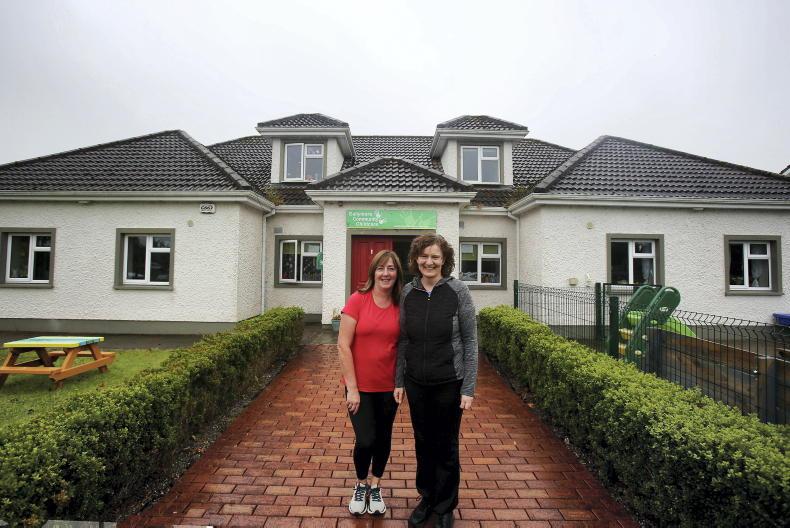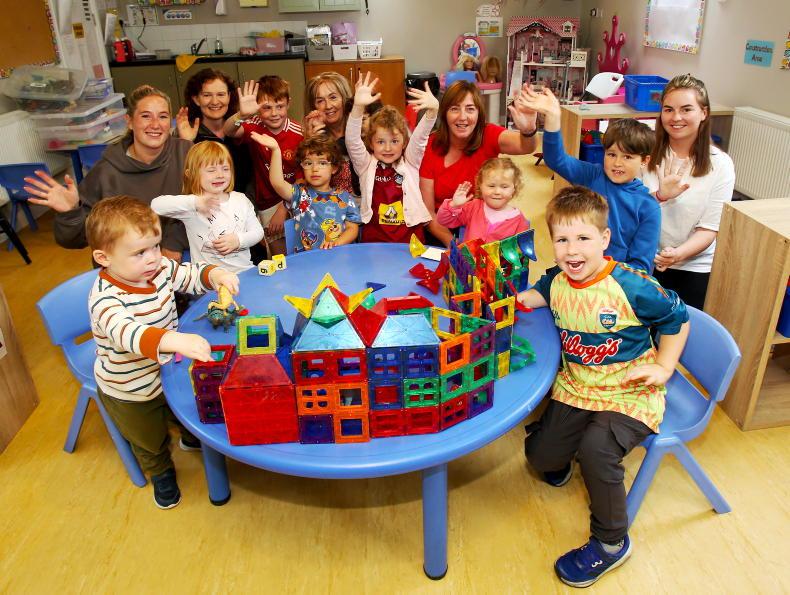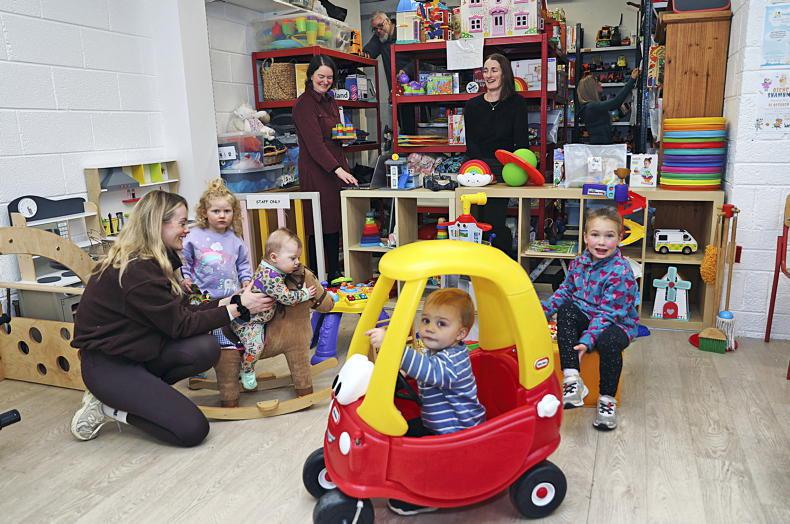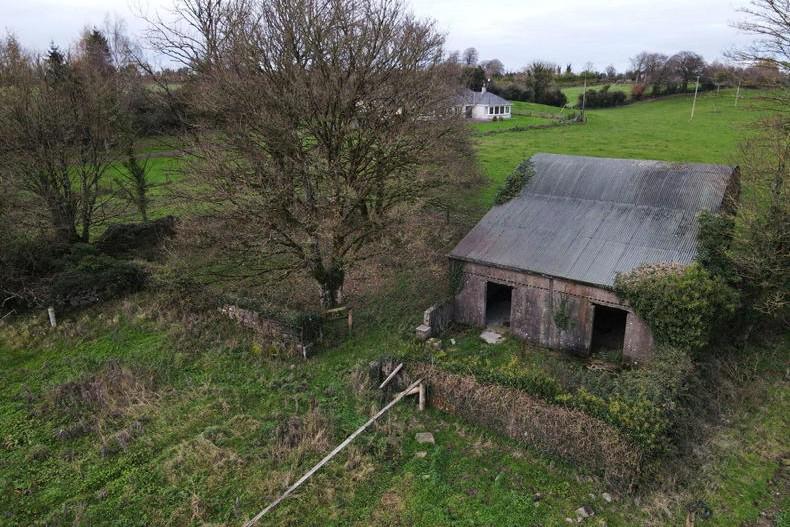Childcare continues to be a huge issue for families across the country with a shortage of creche and childminder places forcing many parents to delay or postpone their return to the workplace.
A new model of funding introduced by the government in 2022 is being blamed for many smaller creches closing their doors, as a freeze on fees continues to impact providers who say they cannot sustain soaring costs due to rising inflation and the cost-of-living crisis.
While increased funding is being granted to service providers from next month, those working in the sector say the Core Funding model is not meeting the needs of crèches that are struggling to remain open.
Ballymore Community Creche serves the small Westmeath village of the same name located ten miles east of Athlone.
The service is at capacity with 90 children attending a range of services each week and a waiting list is in operation.
Families utilising the service are benefiting from not only childcare but school transport and a food provision programme, all of which is being offered despite the freeze on fees demanded by the Core Funding model.
Committed parents
Nora Fagan, manager of the service said the government’s funding model hasn’t worked and has left smaller childcare facilities struggling to keep the doors open.
“We are trying to cater for as many children as possible but it’s increasingly difficult when we haven’t been able to increase our fees and the government funding isn’t making up the difference,” she says.
“We’ve successfully managed the demand for places until the past year or so when things have definitely worsened. We have requests from families across a large hinterland, into Athlone and across to Ballymahon and Mullingar and we also have children attending here from Moate.”
The crèche was opened in 2010 by then President Mary McAleese and came about after a group of committed parents saw an opportunity to develop local childcare, through a European Union funding stream.
“Back in 2004 my own children were very young and there were lots of families like mine who saw the need for a local creche in the area,” explains Nicola.
Fee freeze
“We had a very dedicated and talented group come together to form the original committee and we secured funding through the EU’s Equal Opportunities Capital Funding.
"Betty Nally had managed a small creche in the community centre up to that point but the incredible parents involved back then moved heaven and earth to make the facility we have today happen.”
When the creche first opened it catered for less than 20 children and only offered the pre-school Early Childhood Care and Education (ECCE) Scheme.
Today, there are five sessional services offering everything from breakfast clubs to numeracy and literacy initiatives for the children who attend the ECCE and the afterschool service.

Theresa Meares and Nora Fagan outside Ballymore Community childcare, County Westmeath. / Hany Marzouk.
“We offer a breakfast club to families and operate a school bus service to the four national schools in the area, from where we drop off and collect the children and bring them back for a hot meal and after school club,” says Nora.
“The problem we have with the Core Funding model is that to be a part of it, we had to implement a fee freeze, which in our case was chronic as our fees would be below those of commercial creches anyway.
“Our fees are still in place from 2018 but in the six years since then we’ve had a huge cost of living crisis with the price of electricity, home heating oil and diesel soaring.
"We’ve had to juggle our costs to cover these expenses and that is the reason 15 out of our 18 staff are on part time contracts, including myself. We won’t sacrifice the high quality of service we have here so we are putting ourselves under constant pressure to deliver the care we provide our children.”
Nora calls the increases coming from government next month ‘tokenistic’ and says the allocation for childcare needs to be doubled to have any meaningful effect.
“This paltry increase will not address the bigger problem. The Core Funding model as it currently stands is pushing services to the edge,” she says.
Black hole
“The worry is that government will not take on board how bad things are until more services are forced to close. The frustration is that the solution isn’t complex or contentious. Everyone agrees with the need for and benefit of investment in early years education.
"Minister Roderick O’Gorman will say the government is investing €1 billion into this but it still is only half that of the EU average. Countries like Norway allocate 1% of their GDP in childcare and early intervention whereas in Ireland it’s 0.5%. It’s such an obvious black hole and all the research points to the benefits to the wider economy of investment in this area. It really is a no brainer.”
Nora pays tribute to the staff whose loyalty and dedication has helped navigate the challenges facing the Ballymore creche in recent years.
“Staff retention is a concern when you can only offer people short-term contracts but we are very lucky with the amazing people working here,” she says.
“We are all very invested in our service and we are all very proud of what we are achieving here. We are making a difference in the lives of our children and their families and we need the Minister and the government to step up and fund us so that we can continue to do so.”
’Two fold approach’
Cllr Vinny McCormack is a Fianna Fáil member of Westmeath County Council and is chairman of the board of management at Ballymore Community Creche.
He believes that while core funding does need to be revised, the government’s scheme has merit, if services can withstand the short-term pressure to benefit from long-term gain.

Children and carers Laura Higgins, Nora Fagan, Mena Reilly, Theresa Meares and Nicola McKenna at Ballymore Community childcare, County Westmeath.
“A two-fold approach is essential to addressing the crisis creches are facing across the country,” he says.
“We need to increase funding to the services from the exchequer and we also need to lift the fee freeze which has made a bad situation even worse for childcare facilities that are struggling to stay open.
“These two measures would help make the core funding model a sustainable approach to childcare provision because I do believe that it is a good premise.”
Nicola acknowledges the need to offer financial support to parents for covering the cost of childcare but says the balance has to be met with adequate funding of the services.
“The National Childcare Subsidy is wonderful for parents who are on the brink as it is, trying to make ends meet,” she says.
“We see the difference our food programme is making to families and it’s become a staple of the service we offer.
“But the problem of not resourcing services is being borne out with smaller operators closing. We have families who have come to us from other creches where they have either closed or the service has deteriorated due to the lack of resources. And with fewer places, the problem is only going to get worse.
“We are continuing to lobby the government and we have fantastic support from both Westmeath Childcare Committee and Pobail, both of whom know the problems we face but neither of whom can do anything to help until the policy is changed at government level.”
Next week; we look at the changes due to take effect for childminders later this year as the government introduces new regulations that will require them to register with Tusla by 2028.
Figures released by The Federation of Early Childhood Providers (FECP) this year showed 30 creches, caring for more than 900 children, had given notice of closure to parents, with most citing lack of funding and staffing issues.Core Funding is a grant to early learning and childcare providers towards their operating costs, and in return for significant investment, services agree to conditions of the scheme, including fee management and financial transparency.Some services will be able to apply to the Department of Children for a fee increase for the coming year, but National Childcare Scheme (NCS) subsidies will offset the cost to parents.NCS subsidies are available to parents who avail of Tusla registered childminding services.
Childcare continues to be a huge issue for families across the country with a shortage of creche and childminder places forcing many parents to delay or postpone their return to the workplace.
A new model of funding introduced by the government in 2022 is being blamed for many smaller creches closing their doors, as a freeze on fees continues to impact providers who say they cannot sustain soaring costs due to rising inflation and the cost-of-living crisis.
While increased funding is being granted to service providers from next month, those working in the sector say the Core Funding model is not meeting the needs of crèches that are struggling to remain open.
Ballymore Community Creche serves the small Westmeath village of the same name located ten miles east of Athlone.
The service is at capacity with 90 children attending a range of services each week and a waiting list is in operation.
Families utilising the service are benefiting from not only childcare but school transport and a food provision programme, all of which is being offered despite the freeze on fees demanded by the Core Funding model.
Committed parents
Nora Fagan, manager of the service said the government’s funding model hasn’t worked and has left smaller childcare facilities struggling to keep the doors open.
“We are trying to cater for as many children as possible but it’s increasingly difficult when we haven’t been able to increase our fees and the government funding isn’t making up the difference,” she says.
“We’ve successfully managed the demand for places until the past year or so when things have definitely worsened. We have requests from families across a large hinterland, into Athlone and across to Ballymahon and Mullingar and we also have children attending here from Moate.”
The crèche was opened in 2010 by then President Mary McAleese and came about after a group of committed parents saw an opportunity to develop local childcare, through a European Union funding stream.
“Back in 2004 my own children were very young and there were lots of families like mine who saw the need for a local creche in the area,” explains Nicola.
Fee freeze
“We had a very dedicated and talented group come together to form the original committee and we secured funding through the EU’s Equal Opportunities Capital Funding.
"Betty Nally had managed a small creche in the community centre up to that point but the incredible parents involved back then moved heaven and earth to make the facility we have today happen.”
When the creche first opened it catered for less than 20 children and only offered the pre-school Early Childhood Care and Education (ECCE) Scheme.
Today, there are five sessional services offering everything from breakfast clubs to numeracy and literacy initiatives for the children who attend the ECCE and the afterschool service.

Theresa Meares and Nora Fagan outside Ballymore Community childcare, County Westmeath. / Hany Marzouk.
“We offer a breakfast club to families and operate a school bus service to the four national schools in the area, from where we drop off and collect the children and bring them back for a hot meal and after school club,” says Nora.
“The problem we have with the Core Funding model is that to be a part of it, we had to implement a fee freeze, which in our case was chronic as our fees would be below those of commercial creches anyway.
“Our fees are still in place from 2018 but in the six years since then we’ve had a huge cost of living crisis with the price of electricity, home heating oil and diesel soaring.
"We’ve had to juggle our costs to cover these expenses and that is the reason 15 out of our 18 staff are on part time contracts, including myself. We won’t sacrifice the high quality of service we have here so we are putting ourselves under constant pressure to deliver the care we provide our children.”
Nora calls the increases coming from government next month ‘tokenistic’ and says the allocation for childcare needs to be doubled to have any meaningful effect.
“This paltry increase will not address the bigger problem. The Core Funding model as it currently stands is pushing services to the edge,” she says.
Black hole
“The worry is that government will not take on board how bad things are until more services are forced to close. The frustration is that the solution isn’t complex or contentious. Everyone agrees with the need for and benefit of investment in early years education.
"Minister Roderick O’Gorman will say the government is investing €1 billion into this but it still is only half that of the EU average. Countries like Norway allocate 1% of their GDP in childcare and early intervention whereas in Ireland it’s 0.5%. It’s such an obvious black hole and all the research points to the benefits to the wider economy of investment in this area. It really is a no brainer.”
Nora pays tribute to the staff whose loyalty and dedication has helped navigate the challenges facing the Ballymore creche in recent years.
“Staff retention is a concern when you can only offer people short-term contracts but we are very lucky with the amazing people working here,” she says.
“We are all very invested in our service and we are all very proud of what we are achieving here. We are making a difference in the lives of our children and their families and we need the Minister and the government to step up and fund us so that we can continue to do so.”
’Two fold approach’
Cllr Vinny McCormack is a Fianna Fáil member of Westmeath County Council and is chairman of the board of management at Ballymore Community Creche.
He believes that while core funding does need to be revised, the government’s scheme has merit, if services can withstand the short-term pressure to benefit from long-term gain.

Children and carers Laura Higgins, Nora Fagan, Mena Reilly, Theresa Meares and Nicola McKenna at Ballymore Community childcare, County Westmeath.
“A two-fold approach is essential to addressing the crisis creches are facing across the country,” he says.
“We need to increase funding to the services from the exchequer and we also need to lift the fee freeze which has made a bad situation even worse for childcare facilities that are struggling to stay open.
“These two measures would help make the core funding model a sustainable approach to childcare provision because I do believe that it is a good premise.”
Nicola acknowledges the need to offer financial support to parents for covering the cost of childcare but says the balance has to be met with adequate funding of the services.
“The National Childcare Subsidy is wonderful for parents who are on the brink as it is, trying to make ends meet,” she says.
“We see the difference our food programme is making to families and it’s become a staple of the service we offer.
“But the problem of not resourcing services is being borne out with smaller operators closing. We have families who have come to us from other creches where they have either closed or the service has deteriorated due to the lack of resources. And with fewer places, the problem is only going to get worse.
“We are continuing to lobby the government and we have fantastic support from both Westmeath Childcare Committee and Pobail, both of whom know the problems we face but neither of whom can do anything to help until the policy is changed at government level.”
Next week; we look at the changes due to take effect for childminders later this year as the government introduces new regulations that will require them to register with Tusla by 2028.
Figures released by The Federation of Early Childhood Providers (FECP) this year showed 30 creches, caring for more than 900 children, had given notice of closure to parents, with most citing lack of funding and staffing issues.Core Funding is a grant to early learning and childcare providers towards their operating costs, and in return for significant investment, services agree to conditions of the scheme, including fee management and financial transparency.Some services will be able to apply to the Department of Children for a fee increase for the coming year, but National Childcare Scheme (NCS) subsidies will offset the cost to parents.NCS subsidies are available to parents who avail of Tusla registered childminding services. 










SHARING OPTIONS